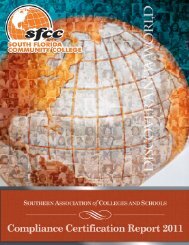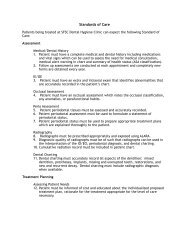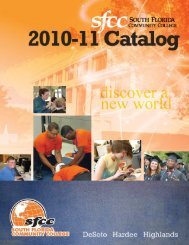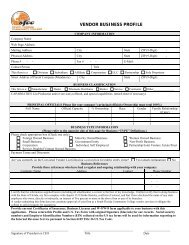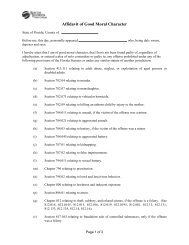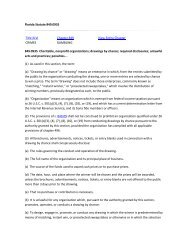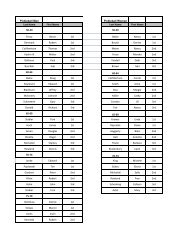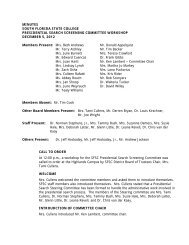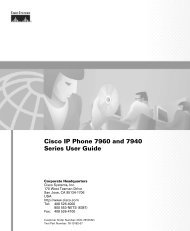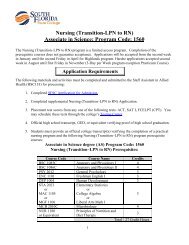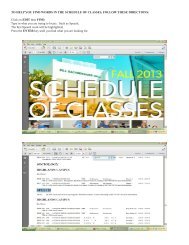2006-07 College Catalog - South Florida State College
2006-07 College Catalog - South Florida State College
2006-07 College Catalog - South Florida State College
- No tags were found...
You also want an ePaper? Increase the reach of your titles
YUMPU automatically turns print PDFs into web optimized ePapers that Google loves.
5HWXUQWR6HFWLRQ0HQXMGF 1106 Liberal Arts Mathematics I 3CJE 1000 Introduction to Law Enforcement 3** Humanities Elective 315Second TermMGF 11<strong>07</strong> Liberal Arts Mathematics II ORSTA 2023 Elementary Statistics (G.E.) 3BSC 1010C General Biology I ORAny lab science in A.A. degree 4CJT 2100 Criminal Investigation 3** Criminal Justice Elective 312Suggested Criminal Justice Electives:CCJ 1194 Interpersonal Communications 3CJE 2300 Police Administration & Organization 3CJT 2110 Modern Crime Scene Investigation 3CJC 2400 Interviews & Interrogation 3CJL 1101 Criminal Law II 3CJL 2130 Criminal Evidence & Procedure 3CJC 2162 Probation, Pardon, & Parole 3CJE 2500 Police Operations 3CJC 2300 Administration of Correctional Institutions 3EMS 1059C Medical First Responder/Health Issues 3CCJ 2949 Co-op Education TrainingAssignment in Criminal Justice 1-4* It may be necessary to first enroll in a lower level English,math, or reading course depending on college placement testscores.** It is the student’s responsibility to meet with the departmentchair or counselor to select the proper course to fulfill thisrequirement.*** Check the course descriptions for prerequisites.<strong>Florida</strong> Gulf Coast University will accept 72 credit hoursfrom <strong>South</strong> <strong>Florida</strong> Community <strong>College</strong> students’ A.S. degreein Criminal Justice Technology toward the Bachelor ofScience Degree, leaving 48 hours to be taken throughFGCU.CRIMINAL JUSTICETECHNOLOGYASSOCIATE IN APPLIED SCIENCEProgram Code: 2100Description of Program: The A.A.S. degree in Criminal JusticeTechnology prepares the student to work in law enforcementagencies, correctional institutions, juvenilecourts, crime laboratories, or mobile units dealing withphysical evidence or to provide continuing workforce trainingfor those previously or currently employed in these occupations.SFCC graduates from Program Code 3270 or3340 may receive articulated credit toward this degree.Contact the Registrar for details.Course content includes, but is not limited to, patrol andinvestigative activities; the handling and care of incarceratedindividuals; procedures for initial and post contact withthe public in such matters as obtaining and relating information;developing critical thinking and decision-makingprocesses; preparing reports, visitation programs, and testifyingin court; techniques for collection, preparation, andtransportation of physical evidence; methods of crime prevention;and methods for investigation, counseling, and referralof neglected/dependent children, delinquents, andyouthful offenders.136Length: Two (2) years (64 credit hours)Prefix Number Course Name Cr. Hrs.FIRST YEARFirst Term* ENC 1101 Freshman English I (G.E.) 3CGS 1100C Intro. to Microcomputersusing Windows (G.E.) 3SYG 2000 General Sociology (G.E.) 3CCJ 1010 Introduction to Criminal Justice 3** Criminal Justice Elective 315Second Term*** ENC 1102 Freshman English II (G.E.) 3CJC 2002 Criminal Behavior 3CCJ 2949 Co-op Education TrainingAssignment in Criminal Justice 1* MGF 1106 Liberal Arts Mathematics I (G.E.) 3CCJ 1220 Criminal Law I 3CJC 1000 Introduction to Corrections 316Summer TermSPC 2600 Oral Communications OR**** EDG 1001 Teacher Capability Development 3CCJ 1000 Juvenile Justice 36



